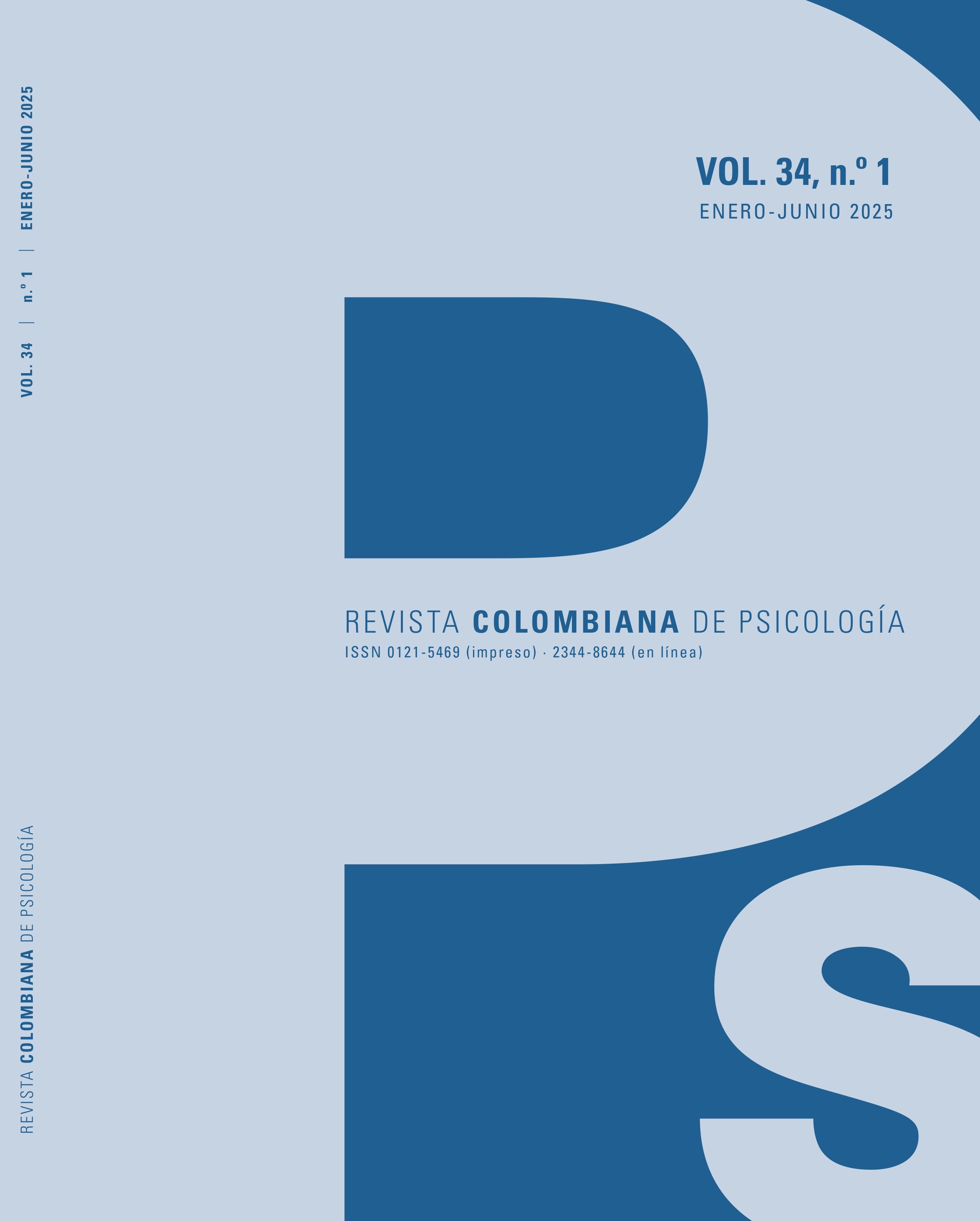Does Gratitude Satisfice?
¿Satisface la gratitud?
DOI:
https://doi.org/10.15446/rcp.v34n1.111984Keywords:
Gratitude, Maximizing, Satisficing, Decision making, Positive emotion, Bounded rationality (en)Downloads
Our emotion plays a crucial role in evaluating and choosing a suitable alternative, though they may not be rational. Experimental studies on Gratitude show that the feeling of Gratitude has its own bias in decision-making. The influence of Gratitude on evaluating alternatives, related to maximizing tendency, is explored in this paper by studying the students’ decision-making process (n = 157 and n =126) through two studies. We found that Gratitude does influence ‘maximizing tendency.’ We found a logarithmic relationship between Gratitude and that ‘maximizing tendency.’ The results have been discussed, followed by future research directions.
Nuestras emociones desempeñan un papel crucial a la hora de evaluar y elegir una alternativa adecuada, aunque no sean racionales. Los estudios experimentales sobre la Gratitud muestran que el sentimiento de Gratitud tiene su propio sesgo en la toma de decisiones. La influencia de la Gratitud en la evaluación de alternativas, relacionada con la tendencia a maximizar, se explora en este trabajo estudiando el proceso de toma de decisiones de los estudiantes a través de dos estudios (n = 157 y n =126). Se utilizó la regresión jerárquica para examinar la influencia de la gratitud en la «tendencia maximizadora». Se encontró una relación logarítmica entre la gratitud y esa 'tendencia maximizadora'. Se han discutido los resultados, seguidos de futuras direcciones de investigación.
References
Algoe, S. B., Haidt, J., & Gable, S. L. (2008). Beyond reciprocity: Gratitude and relationships in everyday life. Emotion, 8(3), 425. https://doi.org/10.1037/1528-3542.8.3.425
Alkozei, A., Smith, R., & Killgore, W. D. (2018). Gratitude and subjective well-being: A proposal of two causal frameworks. Journal of Happiness Studies, 19(5), 1519-1542. https://doi.org/10.1007/s10902-017-9870-1
Alkozei, A., Smith, R., Waugaman, D. L., Kotzin, M. D., Bajaj, S., & Killgore, W. D. (2019). The Mediating Role of Interpretation Bias on the Relationship Between Trait Gratitude and Depressive Symptoms. International Journal of Applied Positive Psychology, 4(3), 135-147. https://doi.org/10.1007/s41042-019-00022-7
Álvarez, F., Rey, J.-M., & Sanchis, R. G. (2014). Choice Overload, Satisficing Behaviour, and Price Distribution in a Time Allocation Model. Abstract and Applied Analysis, 2014, 1–9. https://doi.org/10.1155/2014/569054
Balconi, M., Fronda, G., & Vanutelli, M. E. (2019). A gift for gratitude and cooperative behavior: brain and cognitive effects. Social Cognitive and Affective Neuroscience, 14(12), 1317-1327. https://doi.org/10.1093/scan/nsaa003
Bartlett, M.Y., & DeSteno, D. (2006). Gratitude and pro-social behaviour: Helping when it costs you. Psychological Science, 17, 319-325. https://doi.org/10.1111/j.1467-9280.2006.01705.x
Bosacki, S., Sitnik, V., Dutcher, K., & Talwar, V. (2018). Gratitude, social cognition, and well-being in emerging adolescents. The Journal of genetic psychology, 179(5), 256-269. https://doi.org/10.1080/00221325.2018.1499607
Bubić, A., & Erceg, N. (2018). The Role of Decision-Making Styles in Explaining Happiness. Journal of Happiness Studies, 19(1), 213–229. https://doi.org/10.1007/s10902-016-9816-z
Chaplin, L. N., John, D. R., Rindfleisch, A., & Froh, J. J. (2019). The impact of gratitude on adolescent materialism and generosity. The Journal of Positive Psychology, 14(4), 502-511. https://doi.org/10.1080/17439760.2018.1497688
Chen, L. H., & Chang, Y. P. (2017). Sport-domain gratitude uniquely accounts for athletes’ well-being across two cultures: Incremental validity above the general gratitude. The Journal of Positive Psychology, 12(6), 651-659. https://doi.org/10.1080/17439760.2016.1257052
Cunha, L. F., Pellanda, L. C., & Reppold, C. T. (2019). Positive psychology and gratitude interventions: A randomized clinical trial. Frontiers in psychology, 10, 584. https://doi.org/10.3389/fpsyg.2019.00584
Deng, Y., Xiang, R., Zhu, Y., Li, Y., Yu, S., & Liu, X. (2019). Counting blessings and sharing gratitude in a Chinese prisoner sample: Effects of gratitude-based interventions on subjective well-being and aggression. The Journal of Positive Psychology, 14(3), 303-311. https://doi.org/10.1080/17439760.2018.1460687
DeSteno, D., Bartlett, M. Y., Baumann, J., Williams, L. A., & Dickens, L. (2010). Gratitude as moral sentiment: emotion-guided cooperation in economic exchange. Emotion, 10(2), 289. https://doi.org/10.1037/a0017883
DeSteno, D., Duong, F., Lim, D., & Kates, S. (2019). The grateful don’t cheat: Gratitude as a fount of virtue. Psychological science, 30(7), 979-988. . https://doi.org/10.1177/0956797619848351
Drążkowski, D., Kaczmarek, L. D., & Kashdan, T. B. (2017). Gratitude pays: A weekly gratitude intervention influences monetary decisions, physiological responses, and emotional experiences during a trust-related social interaction. Personality and Individual Differences, 110, 148-153. https://doi.org/10.1016/j.paid.2017.01.043
Duthely, L. M., Nunn, S. G., & Avella, J. T. (2017). A novel heart-centered, gratitude-meditation intervention to increase well-being among adolescents. Education research international, 2017. https://doi.org/10.1155/2017/4891892
Emmons, R. A., & Crumpler, C. A. (2000). Gratitude as a human strength: Appraising the evidence. Journal of social and clinical psychology, 19(1), 56-69. https://doi.org/10.1521/jscp.2000.19.1.56
Emmons, R. A., Froh, J., & Rose, R. (2019). Gratitude. In M. W. Gallagher & S. J. Lopez (Eds.), Positive psychological assessment: A handbook of models and measures (p. 317–332). American Psychological Association. https://doi.org/10.1037/0000138-020
Fasolo, B., Carmeci, F. A., & Misuraca, R. (2009). The effect of choice complexity on perception of time spent choosing: When choice takes longer but feels shorter. Psychology & Marketing, 26(3), 213-228. https://doi.org/10.1002/mar.20270
Ford, M. T., Wang, Y., Jin, J., & Eisenberger, R. (2018). Chronic and episodic anger and gratitude toward the organization: Relationships with organizational and supervisor supportiveness and extra-role behaviour. Journal of occupational health psychology, 23(2), 175. https://doi.org/10.1037/ocp0000075
Forster, D. E., Pedersen, E. J., McCullough, M. E., & Lieberman, D. (2022). Evaluating benefits, costs, and social value as predictors of gratitude. Psychological Science, 33(4), 538-549. https://doi.org/10.1016/j.evolhumbehav.2016.06.003
Fox, G. R., Kaplan, J., Damasio, H., & Damasio, A. (2015). Neural correlates of gratitude. Frontiers in Psychology, 6, 1491. https://doi.org/10.3389/fpsyg.2015.01491
George, J. M., & Dane, E. (2016). Affect, emotion, and decision making. Organizational Behaviour and Human Decision Processes, 136, 47-55. https://doi.org/10.1016/j.obhdp.2016.06.004
Greifeneder, R., Scheibehenne, B., & Kleber, N. (2010). Less may be more when choosing is difficult: Choice complexity and too much choice. Acta Psychologica, 133(1), 45-50. https://doi.org/10.1016/j.actpsy.2009.08.005
Jans-Beken, L., Jacobs, N., Janssens, M., Peeters, S., Reijnders, J., Lechner, L., & Lataster, J. (2020). Gratitude and health: An updated review. The Journal of Positive Psychology, 15(6), 743-782. https://doi.org/10.1080/17439760.2019.1651888
Jiang, H., Sun, P., Liu, Y., & Pan, M. (2016). Gratitude and late adolescents’ school well-being: The mediating role of materialism. Social Indicators Research, 127(3), 1363-1376. https://doi.org/10.1007/s11205-015-1007-5
Kates, S., & DeSteno, D. (2020). Gratitude reduces consumption of depleting resources. Emotion. Advance online publication. https://doi.org/10.1037/emo0000936
Lambert, N. M., Fincham, F. D., Stillman, T. F., & Dean, L. R. (2009). More gratitude, less materialism: The mediating role of life satisfaction. The Journal of Positive Psychology, 4(1), 32-42. https://doi.org/10.1080/17439760802216311
Lerner, J. S., Li, Y., Valdesolo, P., & Kassam, K. S. (2015). Emotion and decision making. Annual review of psychology, 66. https://doi.org/10.1037/a0021557
Locklear, L. R., Sheridan, S., & Kong, D. T. (2022). Appreciating social science research on gratitude: An integrative review for organizational scholarship on gratitude in the workplace. Journal of Organizational Behaviour. https://doi.org/10.1002/job.2624
Ma, L. K., Tunney, R. J., & Ferguson, E. (2017). Does gratitude enhance prosociality?: A meta-analytic review. Psychological Bulletin, 143(6), 601. https://doi.org/10.1037/bul0000103
McCullough, M. E., Emmons, R. A., & Tsang, J. (2002). The grateful disposition: A conceptual and empirical topography. Journal of Personality and Social Psychology, 82, 112–127. https://doi.org/10.1037/0022-3514.82.1.112
McCullough, M. E., Kilpatrick, S. D., Emmons, R. A., & Larson, D. B. (2001). Is gratitude a moral affect?. Psychological Bulletin, 127(2), 249. https://doi.org/10.1037/0033-2909.127.2.249
Misuraca, R., Faraci, P., Gangemi, A., Carmeci, F. A., & Miceli, S. (2015). The Decision Making Tendency Inventory: A new measure to assess maximizing, satisficing, and minimizing. Personality and Individual Differences, 85, 111-116. https://doi.org/10.1016/j.paid.2015.04.043
Morgan, B., Gulliford, L., & Kristjánsson, K. (2017). A new approach to measuring moral virtues: the multi-component gratitude measure. Personality and Individual Differences, 107, 179-189. https://doi.org/10.1016/j.paid.2016.11.044
Newman, D. B., Schug, J., Yuki, M., Yamada, J., & Nezlek, J. B. (2018). The negative consequences of maximizing in friendship selection. Journal of Personality and Social Psychology, 114(5), 804. https://doi.org/10.1037/pspp0000141
Pillay, N., Park, G., Kim, Y. K., & Lee, S. (2020). Thanks for your ideas: Gratitude and team creativity. Organizational Behaviour and Human Decision Processes, 156, 69-81. https://doi.org/10.1016/j.obhdp.2019.11.005
Pohling, R., Diessner, R., & Strobel, A. (2018). The role of gratitude and moral elevation in moral identity development. International Journal of Behavioural Development, 42(4), 405-415. https://doi.org/10.1177/0165025417727874
Rachlin, H., Battalio, R., Kagel, J., & Green, L. (1981). Maximization theory in behavioural psychology. Behavioural and Brain Sciences, 4(3), 371-388. https://doi.org/10.1017/s0140525x00009407
Rao, N., & Kemper, K. J. (2017). Online training in specific meditation practices improves gratitude, well-being, self-compassion, and confidence in providing compassionate care among health professionals. Journal of Evidence-Based Complementary & Alternative Medicine, 22(2), 237-241. https://doi.org/10.1177/2156587216642102
Ruini, C., & Vescovelli, F. (2013). The role of gratitude in breast cancer: Its relationships with post-traumatic growth, psychological well-being and distress. Journal of Happiness Studies, 14(1), 263-274. https://doi.org/10.1007/s10902-012-9330-x
Ruser, J. B., Yukhymenko-Lescroart, M. A., Gilbert, J. N., Gilbert, W., & Moore, S. D. (2020). Gratitude, coach-athlete relationships, and burnout in collegiate student-athletes. Journal of Clinical Sport Psychology, 1(aop), 1-17. https://doi.org/10.1123/jcsp.2019-0021
Schwartz, B. (2016). On the meaning and measurement of maximization. Judgment and Decision making, 11(2), 126. https://doi.org/10.1017/s1930297500007257
Schwartz, B., Ward, A., Monterosso, J., Lyubomirsky, S., White, K., & Lehman, D. R. (2002). Maximizing versus satisficing: Happiness is a matter of choice. Journal of personality and social psychology, 83(5), 1178. https://doi.org/10.1037/0022-3514.83.5.1178
Smith, A., Pedersen, E. J., Forster, D. E., McCullough, M. E., & Lieberman, D. (2017). Cooperation: The roles of interpersonal value and gratitude. Evolution and Human Behaviour, 38(6), 695-703. https://doi.org/10.1016/j.evolhumbehav.2017.08.003
Syropoulos, S., Watkins, H. M., Shariff, A. F., Hodges, S. D., & Markowitz, E. M. (2020). The role of gratitude in motivating intergenerational environmental stewardship. Journal of Environmental Psychology, 72, 101517. https://doi.org/10.1016/j.jenvp.2020.101517
Sztachańska, J., Krejtz, I., & Nezlek, J. B. (2019). Using a gratitude intervention to improve the lives of women with breast cancer: A daily diary study. Frontiers in Psychology, 10, 1365. https://doi.org/10.3389/fpsyg.2019.01365
Tangney, J. P., Stuewig, J., & Mashek, D. J. (2007). Moral emotions and moral behaviour. Annual review of psychology, 58, 345. https://doi.org/10.1146/annurev.psych.56.091103.070145
Tsang, J. A. (2020). (Un) special Favors: Gratitude for Group-Based Benefits. The Journal of Positive Psychology, 1-11. https://doi.org/10.1080/17439760.2020.1716051
Vargová, L., Zibrínová, Ľ., & Baník, G. (2020). The way of making choices: Maximizing and satisficing and its relationship to well-being, personality, and self-rumination. Judgment and Decision making, 15(5), 798. https://doi.org/10.1017/s1930297500007932
Vayness, J., Duong, F., & DeSteno, D. (2020). Gratitude increases third-party punishment. Cognition and Emotion, 34(5), 1020-1027. https://doi.org/10.1080/02699931.2019.1700100
Ward, R. G. (2017). Thanks to Whom? The Virtuous Cycle of Targeted Gratitude in Organizations. In Academy of Management Proceedings (Vol. 2017, No. 1, p. 12264). Briarcliff Manor, NY 10510: Academy of Management. https://doi.org/10.5465/ambpp.2017.12264abstract
Watkins, P. C., & Bell, J. (2017). Current theories and research in the psychology of gratitude. Scientific Advances in Positive Psychology, 103-129.
Watkins, P. C., Emmons, R. A., & McCullough, M. E. (2004). Gratitude and subjective well-being. Scientific concepts behind happiness, kindness, and empathy in contemporary society, 167-192.. https://doi.org/10.1037/e514732007-001
Watkins, P. C., Grimm, D. L., & Kolts, R. (2004). Counting your blessings: Positive memories among grateful persons. Current Psychology, 23(1), 52-67. https://doi.org/10.1007/s12144-004-1008-z
White, K., Habib, R., & Hardisty, D. J. (2019). How to SHIFT consumer behaviours to be more sustainable: A literature review and guiding framework. Journal of Marketing, 83(3), 22-49. https://doi.org/10.1007/s12144-004-1008-z
Wood, A. M., Froh, J. J., & Geraghty, A. W. (2010). Gratitude and well-being: A review and theoretical integration. Clinical Psychology Review, 30(7), 890-905. https://doi.org/10.1016/j.cpr.2010.03.005
Zhang, Y., Chen, Z. J., & Ni, S. (2020). The security of being grateful: Gratitude promotes risk aversion in decision-making. The Journal of Positive Psychology, 15(3), 285-291. https://doi.org/10.1080/17439760.2019.1610483
How to Cite
APA
ACM
ACS
ABNT
Chicago
Harvard
IEEE
MLA
Turabian
Vancouver
Download Citation
License

This work is licensed under a Creative Commons Attribution-NonCommercial-NoDerivatives 4.0 International License.
The RCP is published under the Creative Commons license and can be copied and reproduced according to the conditions of this license (http://creativecommons.org/licenses/by-nc-nd/2.5). RCP articles are available online at https://revistas.unal.edu.co/index.php/psicologia/issue/archive. If you would like to subscribe to the RCP as reader, please go to https://revistas.unal.edu.co/index.php/psicologia/information/readers and follow the instructions mentioned in the webpage. Additionally, a limited number of print journals are available upon request. To request print copies, please email revpsico_fchbog@unal.edu.co.


























